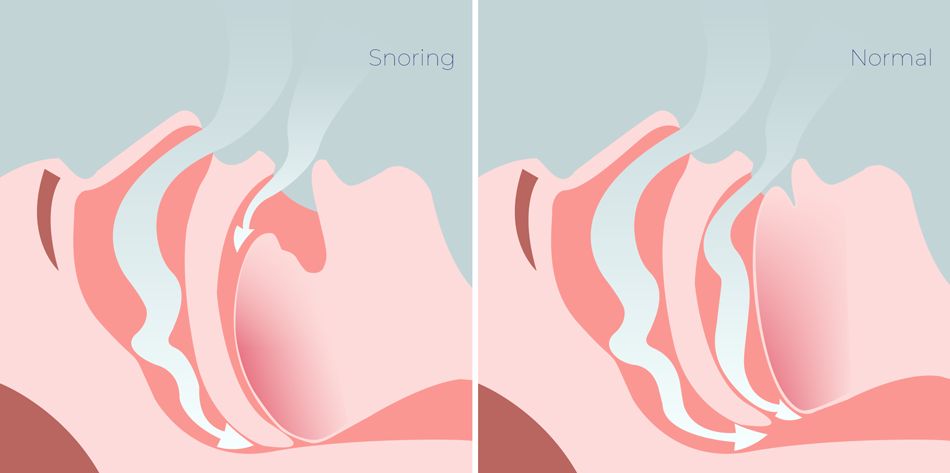Why Do I Snore?
Snoring is a snorting or rattling noise made during sleep. For some, it is limited to short individual snorts. For others, their snoring is consistent during all stages of their sleep and occurs every night. Similarly, some people’s snoring can be quite quiet, while others can be heard in the next room.
Here is an explanation as to why you snore, and how to stop it.
What causes you to snore?
As you sleep the soft tissue in your airways can relax and vibrates as air passes over it, causing the snoring noise. The soft tissue in the nasal passages, the soft layer at the back of your mouth, the base of your tongue, your tonsils or your uvula can cause you to snore.

When I’m awake, why don’t I make snoring noises?
When you are asleep, your muscles and body relax. This causes the soft tissue in your airways to loosen, making them soft and more susceptible to vibrations. The vibrations are the source of the noises. Plus, the loosened tissue reduces the size of your airway. This means air passes through the airway more quickly, and this increases the vibrations, causing you to snore. Often illnesses such as a common cold can cause your snoring to worsen, as it can further restrict the airways.
What can make you more likely to snore?
Many factors can affect the severity of somebody’s snoring. They include:
- Weight – being overweight or clinically obese can increase the amount of soft tissue around the throat. This increases the pressure on the throat during sleep, causing it to narrow further. Typically a person who is obese, and/or has a neck size above 17 inches, are more likely to snore. Often they will snore more loudly and more frequently than somebody of average weight.
- Smoking – smoke causes inflammation in the airway, restricting the airflow and increasing the likelihood of snoring.
- Alcohol – alcohol relaxes the muscles and makes the tissue in your throat and mouth more prone to vibrations.
- Allergies – any allergy that results in rhinitis (runny nose) will cause the nasal passages to become inflamed. This restricts them, making snoring more likely.
Often snoring worsens with age, as more tissue develops, and muscles weaken.
How to snore no more!
Now that you know what causes you to snore, you are better placed to find a solution. Proven treatment methods include:
Lifestyle Changes
If your BMI (body mass index) is above 25, you are likely to notice a reduction in the intensity of your snoring if you can lose weight. Reducing your weight may prevent your snoring entirely.
Stopping (or at least reducing) your smoking and or alcohol consumption can lead to a reduction in the severity of your snoring.
Anti-Snoring Products
There are numerous snoring products to help people who snore.
Obstructive Sleep Apnoea testing
Being told that you snore may be embarrassing, but in most cases, snoring is harmless to the snorer and mostly an annoyance to the listener. However, if you experience any or all of these other problems, then it could be more serious:
- Excessive sleepiness during the day
- Lack of concentration
- You have been told you choke or stop breathing during sleep
- You have a BMI above 25
- Have a recessed jaw or deviated septum
- Need to urinate frequently at night
These problems are indicators that you might have obstructive sleep apnoea. Obstructive Sleep Apnoea or OSA is a sleep disorder, where a person’s airway regularly closes, and they stop breathing during sleep. These regular interruptions disrupt sleep, causing the person to wake up not feeling refreshed and often tired throughout the day.
If you suspect that you may have OSA, then we recommend reading our guide to getting a Sleep Study conducted. You could be receiving treatment and sleeping soundly again within weeks. Even better – as well as treating OSA, you may also no longer snore!
